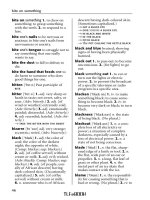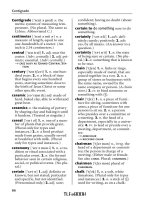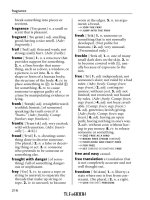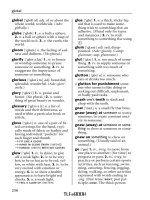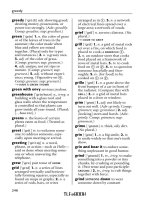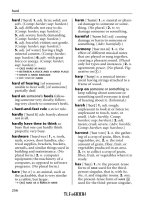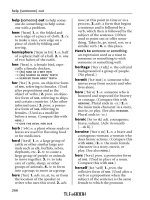NTC''''s Pocket Dictionary of Words and Phrases part 50 pdf
Bạn đang xem bản rút gọn của tài liệu. Xem và tải ngay bản đầy đủ của tài liệu tại đây (236.45 KB, 10 trang )
mances.) 4. n. a symbol on a com-
puter screen that shows that the
computer is ready to receive infor-
mation.
pron. an abbreviation of pronoun.
prone to
doing something
likely to
[do] something; apt to do some-
thing.
pronoun ["pro naUn] n. a word that
takes the place of a noun or nomi-
nal and refers to someone or
something already mentioned.
(Abbreviated pron. here.)
→
reflexive (pronoun)
pronounce [pr@ "naUns] 1. tv. to
speak the sound of a letter or a
word; to make the sound of a letter
or a word.
2. tv. to declare some-
thing about someone or some-
thing officially.
pronunciation [pr@ n@n si "e S@n]
n. the way a letter, group of letters,
or a word sounds when spoken;
the way someone says things.
(Plural only for types and
instances.)
proof ["pruf] 1. n. something that
shows that something is definitely
true. (No plural.)
2. n. a printed
copy of something that is checked
for mistakes before the final copy
is printed; a first or sample version
of a photograph.
3. tv. to proof-
read something.
proofread ["pruf rid] 1. tv., irreg. to
read something very carefully to
look for mistakes. (Past tense and
past participle: proofread [
"pruf
rEd
].) 2. iv., irreg. to read very
carefully to look for mistakes.
prop ["prap] n. an object that is
used in a play or in a movie by an
actor.
prop
someone or something
up to
support someone or something; to
prevent someone or something
from falling.
propaganda [prap @ "gAn d@] n.
information that tries to influence
or change how people think. (No
plural.)
propeller [pro "pEl #] n. a set of
blades that rotate very fast in air or
water, used to push or move a boat
or an airplane.
proper ["prap #] 1. adj. right; suit-
able; correct; appropriate. (Adv:
properly.)
2. adj. [in grammar, of a
noun] referring to a person or
place. (Such nouns are capital-
ized.)
3. adj. referring to a particu-
lar place itself, and not an area
outside of that place. (Not
prenominal. Adv: properly.)
properly ["prap # li] 1. adv. in the
right way; suitably; appropriately;
according to what is expected.
2. adv. strictly.
property ["prap # ti] 1. n. some-
thing that is owned. (No plural.)
2. n. an amount of land and any
structures that have been built on
it. (No plural.)
prophecy ["praf @ si] n. the ability
to foresee the future. (Plural only
for types and instances.)
prophesy ["praf @ saI] tv. to predict
what will happen in the future; to
say that something is going to hap-
pen. (The object can be a clause
with
that U.)
pron.
456
07 7/23/03 8:50 AM Page 456
TLFeBOOK
prophet ["praf It] 1. n. someone
who has the talent of being able to
see into the future.
2. n. [in some
religions] a person chosen to
speak for God.
proportion [pr@ "por S@n] 1. n. the
relationship between the sizes of
different parts of someone or
something.
2. tv. to adjust the
amount, degree, or size of some-
thing in comparison to something
else.
→
blow
something
out of (all)
proportion
→ in proportion
→ out of proportion
proposal [pr@ "poz @l] 1. n. a sug-
gestion; a plan.
2. n. an offer of
marriage made to someone.
propose [pr@ "poz] tv. to suggest
something; to say something so
that it is considered. (The object
can be a clause with
that U.)
propose a toast to make a toast
W, before drinking.
propose (to
someone
) to ask
someone to marry one.
proposition [prap @ "zI S@n] 1. n. a
proposal; something that is being
considered; a suggestion.
2. n. a
statement; a statement that is to be
proved either true or false.
propulsion [pr@ "p^l S@n] n. a force
that causes something to move
forward. (No plural form.)
→
jet propulsion
prose ["proz] n. the usual form of
written language; writing that is
not in verse. (No plural.)
prosper ["pras p#] iv. to become
successful; to earn enough money
so that one can live well; to thrive.
prosperity [pras "pEr @ ti] n. the
condition of being prosperous;
success; monetary success. (No
plural.)
prosperous ["pras p@ r@s] adj.
thriving; earning or having
enough money so that one can live
well. (Adv: prosperously.)
protect [pr@ "tEkt] tv. to keep
someone or something safe; to
guard someone or something.
protection [pr@ "tEk S@n] n. keep-
ing someone or something safe;
the quality offered by someone or
something that protects. (Plural
only for types and instances.)
protective [pr@ "tEk tIv] adj. pro-
tecting someone or something;
giving protection; defending;
keeping someone or something
safe. (Adv: protectively.)
protein ["pro tin] n. one of many
chemical substances important to
the cells of all living plants and
animals. (Usually thought of in
terms of food.)
protest 1. ["pro tEst] n. a group of
people displaying opposition or
anger.
2. ["pro tEst] n. a com-
plaint.
3. [pr@ "tEst] tv. to com-
plain about something; to show
disapproval of something. (The
object can be a clause with
that
U.) 4. [pr@ "tEst] iv. to complain
about something.
→ a
ripple of protest
proton ["pro tan] n. a particle in
the
nucleus W of an atom that
carries a positive electrical charge.
prototype ["pro t@ taIp] n. the
original example of something
prototype
457
07 7/23/03 8:50 AM Page 457
TLFeBOOK
from which later examples are
developed.
proud ["praUd] 1. adj. showing or
feeling pride; having a good opin-
ion about oneself and what one
has accomplished. (Adv: proudly.
Comp: prouder; sup: proudest.)
2. adj. causing someone to feel
pride. (Adv: proudly. Comp:
prouder; sup: proudest.)
3. adj.
having too high an opinion about
oneself; arrogant. (Adv: proudly.
Comp: prouder; sup: proudest.)
→
(as) proud as a peacock
prove ["pruv] tv., irreg. to provide
proofofsomething; to be the
proof of something. (Past partici-
ple: proved or
proven. The object
can be a clause with
that U.)
prove to be
something
to be shown
to be someone or something; to be
found to be someone or some-
thing.
proven ["pruv @n] a past participle
of
prove.
provide [pr@ "vaId] 1. tv. to furnish
or supply someone or something
with something.
2. tv. to state or
tell something.
provide for
someone
to support
someone by earning enough
money to supply the person with
food, clothing, and shelter.
provide for
something
to allow
something to occur or to be sup-
plied.
provided that
something
is the
case on the condition that some-
thing is the case; only if something
is the case.
province ["pra vIns] 1. n. one of
the main divisions of a country,
such as Canada, similar to a state.
2. n. an area of study, knowledge,
or activity.
provincial [pr@ "vIn S@l] 1. adj. of
or about a province or provinces
of a country. (Adv: provincially.)
2. adj. of limited, local experience;
rural in attitude and outlook.
(Usually derogatory. Adv: provin-
cially.)
provision [pr@ "vI Z@n] 1. n. a con-
dition; a detail or statement.
2. n.
an arrangement that is made
ahead of time. (Often plural.)
provisions n. food and supplies
needed for everyday living.
(Treated as plural, but not counta-
ble.)
provoke [pr@ "vok] 1. tv. to make
someone angry; to irritate some-
one.
2. tv. to cause an action to
start or to happen. (Usually lead-
ing to negative results.)
prowl ["praUl] iv. to sneak around
quietly, like an animal hunting for
food or a thief looking for some-
thing to steal.
prowler ["praUl #] n. a thief; a bur-
glar who sneaks about in the
night.
prude ["prud] n. someone who is
easily offended or shocked; some-
one who is overly modest or
proper.
prudence ["prud ns] n. wisdom;
care in thought and action;
thoughtful judgment. (No plural.)
prudent ["prud nt] adj. wise; think-
ing carefully before one does
something. (Adv: prudently.)
proud
458
07 7/23/03 8:50 AM Page 458
TLFeBOOK
prudish ["prud IS] adj. too easily
shocked or offended; too modest.
(Adv: prudishly.)
prune ["prun] 1. n. a dried plum,
eaten as food.
2. iv. to remove
extra branches or leaves from a
plant; to trim a tree, flower, bush,
or shrub so that it has a nice, even
shape.
3. tv. to make a plant look
nice by removing extra branches
or leaves.
prune
something
off ((of)
some-
thing
) to cut something off some-
thing.
pry ["praI] iv. to be too curious; to
ask personal questions about
things that should not concern
one.
pry into
something
to snoop into
something; to try to learn about
someone else’s private matters.
pry
something
off ((of)
something
)
to use a lever to get something off
something.
pry
something
open to open some-
thing with a tool by using force.
pry
something
up to raise some-
thing, as with a lever.
psychiatrist [sI "kaI @ trIst] n. a
doctor who treats people who have
sicknesses of the mind.
psychiatry [sI "kaI @ tri] n. the sci-
ence of treating people who have
sicknesses of the mind. (No plu-
ral.)
psychological [saI k@ "ladZ I k@l]
1. the adj. form of psychology Q.
(Adv: psychologically [
Ik li].)
2. the adj. form of psychology W.
(Adv: psychologically [
Ik li].)
psychologist [saI "kal @ dZIst] n.
someone who is trained in psy-
chology; a specialist in behavior.
psychology [saI "kal @ dZi] 1. n.
the study and science of the mind
and the behavior of individuals.
(No plural.)
2. n. the way people
behave, think, and feel; the way a
person behaves, thinks, and feels.
(No plural.)
public ["p^b lIk] adj. available to
everyone; available to people in
general; not restricted; not private.
(Adv: publicly.)
→
air
one’s
dirty linen in public
→ in public
→ in the public eye
→ wash
one’s
dirty linen in public
the public n. people in general. (No
plural.)
public school ["p^b lIk "skul] n. a
school that is paid for by the gov-
ernment through taxes and that is
available to all local children.
publication [p@b l@ "ke S@n] 1. n.
making information in written
form, such as in a book, magazine,
or newspaper, available to the
public. (No plural.)
2. n. any writ-
ten document that is published.
→
not for publication
publicity [p@b "lIs @ ti] n. informa-
tion that is brought to everyone’s
attention. (No plural.)
publicly ["p^b lIk li] adv. [done] in
public; [done] where people can
see.
publish ["p^b lIS] 1. tv. to assemble,
print, and sell books, magazines,
newspapers, or other printed
materials.
2. tv. to make some-
thing well known.
publish
459
07 7/23/03 8:50 AM Page 459
TLFeBOOK
publisher ["p^b lI S#] n. someone
or a company that assembles,
prints, and makes written materi-
als available for sale.
pudding ["pUd IN] n. a soft, sweet,
creamy food, usually eaten as a
dessert. (Plural only for types and
instances.)
puddle ["p^d l] n. a collection of
water or other liquid on the
ground or the surface of some-
thing.
puff ["p^f] 1. n. a short blast of air,
smoke, steam, gas, etc., that is
blown out from something.
2. tv.
to blow air, steam, smoke, etc., out
a little bit at a time.
3. iv. to pull
smoke from a cigarette or a cigar
with small breaths.
4. iv. to
breathe when one is out of breath;
to breathe with short, quick
breaths.
→
huff and puff
puff out to swell out.
puff
someone or something
up to
boost or promote someone or
something.
puff
something
out to cause some-
thing to swell out or expand out-
ward.
puff up (into
something
) to as-
sume a larger shape by filling up
with air or water; to swell up into
something.
pull ["pUl] 1. tv. to move someone
or something in some direction.
2. tv. to drag someone or some-
thing behind oneself; to move
someone or something behind
oneself while one is moving.
3. n. a tug.
pull in(to
someplace
) to drive into
someplace.
pull off (
something
) to steer or turn
a vehicle off the road.
pull out all the stops to use all
one’s energy and effort in order to
achieve something. (From the
stops of a pipe organ. The more
that are pulled out, the louder it
gets.)
pull out (of
something
) 1. to with-
draw from something.
2. to drive
out of something, such as a drive-
way, parking space, garage, etc.
pull
someone
in(to
something
) to
get someone involved in some-
thing.
pull
someone or something
up to
drag or haul someone or some-
thing upward or to an upright
position.
pull
someone’s
leg to kid, fool, or
trick someone.
pull
someone’s or something’s
teeth to reduce the power of
someone or something; to make
someone or something less of a
threat.
pull
something
down to tear some-
thing down; to raze something,
such as a building.
pull
something
off ((of)
some-
thing
) to pull, tow, tug, or drag
something off something else.
pull
something
out to withdraw
something.
pull
something
out of a hat and
pull
something
out of thin air to
produce something as if by magic.
pull
something
out of thin air Go
to
pull
something
out of a hat.
publisher
460
07 7/23/03 8:50 AM Page 460
TLFeBOOK
pull
something
up (out of
some-
thing
) to draw something up out of
something.
pull the rug out (from under
someone
) to make someone inef-
fective.
pull the wool over
someone’s
eyes to deceive someone.
pull through (
something
) to sur-
vive something.
pull up (
someplace
) to arrive at a
place in a vehicle; [for a vehicle] to
arrive someplace.
pull up stakes to move to another
place. (As if one were pulling up
tent stakes.)
pulp ["p^lp] 1. n. the soft part
inside a fruit, vegetable, or plant.
(No plural.)
2. n. any soft, par-
tially solid, wet substance. (No
plural.)
3. tv. to make W from
something.
pulpit ["pUl pIt] n. a raised platform
that a preacher, priest, minister,
etc., stands on when preaching.
pulse ["p^ls] 1. n. the rhythm of
the flow of blood through one’s
body, caused by the beating of the
heart. (No plural.)
2. n. a rhythm
with a regular beat; a movement of
something with regular stops and
starts.
3. iv. to beat regularly, like
the beating of the heart; to beat in
rhythm.
→
take
someone’s
pulse
pump ["p^mp] 1. n. a device that
forces air, liquid, or gas through a
tube or pipe.
2. tv. to force air, liq-
uid, or gas through a tube or pipe.
pump
something
in(to
someone or
something
) to try to force some-
thing, such as a gas, liquid, infor-
mation, or money into someone or
something.
pump
something
out to empty
something by pumping.
pump
something
out (of
someone
or something
) to remove some-
thing from someone or something
by force or suction.
pumpkin ["p^mp kIn] 1. n. a large,
round, heavy orange fruit that
grows on a vine.
2. adj. made with
Q.
punch ["p^ntS] 1. n. a sweet drink
made by mixing many different
things, usually including some
kind of fruit juice. (No plural.)
2. n. a tool or machine that pierces
holes through objects or that
stamps designs on objects.
3. n. a
quick, powerful hit.
4. n. impact;
effective power; strength. (Figura-
tive on E.)
5. tv. to hit someone
or something powerfully with
one’s fist.
punch a hole in
something
to
make a hole in something with
something.
punch in to record one’s arrival at
one’s workplace at a certain time.
punch out to record that one has
left one’s workplace at a certain
time.
punch
something
out (of
some-
thing
) to press on something and
make it pop out of something.
punch
something
up to register a
figure on a cash register.
punctuation [p@Nk tSu "e S@n] n.
the use of
punctuation marks to
make writing easier to understand.
(No plural.)
punctuation
461
07 7/23/03 8:50 AM Page 461
TLFeBOOK
punctuation mark [p@Nk tSu "e
S@n mark
] n. a symbol used to
make writing easier to understand,
such as the period (.), the comma
(,), the colon (:), the question
mark (?), the exclamation point
(!), and the hyphen (-), among
others.
puncture ["p^nk tS#] 1. n. a hole in
the surface of something made by
a sharp or pointed object.
2. tv. to
make a hole in the surface of
something by using a sharp or
pointed object.
punish ["p^n IS] 1. tv. to give some-
one a penalty for doing something
wrong.
2. tv. to use or handle
something roughly. (Figurative on
Q.)
punishment ["p^n IS m@nt] 1. n.
punishing; the practice of giving
penalties for doing something
wrong. (No plural.)
2. n. rough
treatment. (Figurative on Q. No
plural.)
→ a
glutton for punishment
punk ["p^Nk] 1. n. a young crimi-
nal; a young person who gets into
trouble a lot.
2. n. a loud, harsh
style of music first made popular
in the late 1970s by young people.
(No plural.)
3. the adj. use of Q
or W.
puny ["pju ni] adj. smaller and
weaker than average. (Adv: punily.
Comp: punier; sup: puniest.)
pup ["p^p] n. a young dog; a puppy;
the young of certain animals,
including the seal.
pupil ["pju p@l] 1. n. a student;
someone who studies in school;
someone who is taught by a
teacher.
2. n. the round, black
opening in the middle of the col-
ored part of the eye that allows
light into the eye.
puppy ["p^p i] n. a young dog.
purchase ["p# tS@s] 1. n. an
instance of buying something.
2. n. something that is bought.
3. tv. to buy something.
purchaser ["p# tS@ s#] n. a buyer;
someone who buys something.
pure ["pjUr] 1. adj. completely
made from only one thing; not
mixed with anything. (Adv: purely.
Comp: purer; sup: purest.)
2. adj.
[of a color] clear and not cloudy.
(Adv: purely. Comp: purer; sup:
purest.)
3. adj. mere; absolute;
nothing but. (Adv: purely. Comp:
purer; sup: purest.)
4. adj. without
sin; without evil. (Adv: purely.
Comp: purer; sup: purest.)
5. adj.
not having had sex. (Adv: purely.
Comp: purer; sup: purest.)
purge ["p#dZ] 1. n. an instance of
forcing unwanted people to leave a
government, university, society, or
other group.
2. tv. to make some-
thing clean by getting rid of what
is dirty; to clean something out.
3. tv. to destroy records or files.
purity ["pjUr @ ti] n. the quality of
being pure; the degree to which
something is pure. (No plural.)
purple ["p# p@l] 1. n. the color
made by mixing blue and red; the
color of ripe grapes that are not
green or red. (Plural only for types
and instances.)
2. adj. of the color
Q.
purpose ["p# p@s] n. an intention;
the reason that someone does
something; a kind of goal.
punctuation mark
462
07 7/23/03 8:50 AM Page 462
TLFeBOOK
→ on purpose
purse ["p#s] 1. n. a bag used, espe-
cially by women, to hold money
and other personal items.
2. n. an
amount of money that is offered as
a prize.
→
control the purse strings
→ make a silk purse out of a sow’s
ear
pursue [p# "su] 1. tv. to chase
someone or something; to follow
and attempt to catch someone or
something.
2. tv. to continue to
work toward something; to seek
something.
3. tv. to follow a plan
of action.
pursuit [p# "sut] 1. n. pursuing
someone or something; chasing
after someone or something. (No
plural.)
2. n. a hobby or job that
fills one’s time.
push ["pUS] 1. iv. to force move-
ment in a certain direction.
2. tv.
to apply pressure to something, as
if to move it.
3. tv. to move some-
thing or someone by applying
pressure.
4. n. a shove; a powerful
movement that causes something
to move. (No plural.)
push ahead to move forward or
advance with force or effort; to
move by using pressure.
push off to go away.
push
one’s
luck and press
one’s
luck to expect continued good
fortune; to expect to continue to
escape bad luck.
push (
oneself
) away (from
some-
thing
) to move oneself back and
away from something.
push out to spread out; to expand
outward.
push
someone or something
out
(of
something
) to force someone
or something out of something.
push
someone or something
up to
raise or lift someone or some-
thing.
push
someone
to the wall and
press
someone
to the wall to
force someone into a position
where there is only one choice to
make; to put someone in a defen-
sive position.
push
something
off on(to)
some-
one
to place one’s task onto
another person; to make someone
else do an unwanted job.
push through
something
or
some-
place
to force [one’s way] through
a crowded place.
put ["pUt] 1. tv., irreg. to place
something in a certain position; to
cause something to be in a certain
place or position; to move some-
thing to a certain place or posi-
tion. (Past tense and past
participle: put.)
2. tv., irreg. to
express something; to say some-
thing in a certain way.
→
stay put
put a bee in
someone’s
bonnet
Go to have a bee in
one’s
bonnet.
put a cap on
something
to put a
limit on something.
put a hold on
something
to place a
restriction on something showing
it is reserved, delayed, or inacti-
vated.
put a spin on
something
to inter-
pret an event to make it seem
favorable or beneficial to oneself.
put a stop to
something
to make
something end; to stop something.
put a stop to something
463
07 7/23/03 8:50 AM Page 463
TLFeBOOK
put all
one’s
eggs in one basket
to risk everything at once.
put in a good word (for
some-
one
) to say something (to some-
one) in support of someone else.
put in
one’s
oar to give help; to
interfere by giving advice; to add
one’s assistance to the general
effort.
put in
one’s
two cents(’ worth)
to add one’s comments (to some-
thing). (Implies that one’s com-
ments may not be of great value
but need to be stated anyway.)
put on to pretend; to deceive.
put on a brave face to try to
appear happy or satisfied when
faced with misfortune or danger.
put on
one’s
thinking cap to start
thinking in a serious manner.
put
one
through
one’s
paces to
make one demonstrate what one
can do; to make one do one’s job
thoroughly.
put
one’s
best foot forward to act
or appear at one’s best; to try to
make a good impression.
put
one’s
cards on the table and
lay
one’s
cards on the table to
reveal everything; to be open and
honest with someone.
put
one’s
foot in it Go to put
one’s
foot in
one’s
mouth.
put
one’s
foot in
one’s
mouth and
put
one’s
foot in it; stick
one’s
foot in
one’s
mouth to say some-
thing that one regrets; uninten-
tionally to say something stupid,
insulting, or hurtful.
put
one’s
hand to the plow to
begin to do a big and important
task; to undertake a major effort.
put
one’s
mind to
something
to
give one’s complete attention to
something.
put
one’s
nose to the grindstone
to keep busy doing one’s work.
put
one’s
shoulder to the wheel
to get busy.
put
oneself
out to inconvenience
oneself.
put out to generate lots of some-
thing. (Colloquial.)
put some teeth into
something
to
increase the power of something.
put
someone
off 1. to delay action
with someone.
2. to repel some-
one.
put
someone
on to tease or deceive
someone.
put
someone or some creature
to
sleep 1. to kill someone or some
creature. (Euphemistic.)
2. to
cause someone or some creature to
sleep, perhaps through drugs or
anesthesia.
put
someone or something
out to
pasture to retire someone or
something. (Originally said of a
horse that was too old to work.)
put
someone or something
over to
succeed in making someone or
something be accepted.
put
someone
out to annoy or irri-
tate someone.
put
someone
through the
wringer to give someone a diffi-
cult time. (As one squeezes water
from clothing in an old-fashioned
wringer washing machine.)
put all one’s eggs in one basket
464
07 7/23/03 8:50 AM Page 464
TLFeBOOK
put
someone
to bed to help some-
one—usually a child—get into a
bed.
put
someone
to shame to make
someone ashamed; to embarrass
someone, especially by outdoing
someone.
put
someone
to sleep to bore
someone.
put
someone
to the test to test
someone; to see what someone can
achieve.
put
someone
up (for
something
) to
nominate or offer someone for
some office or task.
put
someone’s
eye out to puncture
or harm someone’s eye and
destroy its ability to see.
put
someone’s
nose out of joint
to offend someone; to cause some-
one to feel slighted or insulted.
put
something
across (to
someone
) to make something
clear to someone.
put
something
down to take the life
of a creature mercifully.
put
something
off (until
some-
thing
) to postpone or delay some-
thing until something happens or
until some future time.
put
something
on to dress in an
article of clothing.
put
something
on ice and put
something
on the back burner
to delay or postpone something; to
put something on hold.
put
something
on paper to write
something down; to write or type
an agreement on paper.
put
something
on the back
burner
Go to put
something
on ice.
put
something
on the cuff to buy
something on credit; to add to
one’s credit balance. (As if one
were making a note of the pur-
chase on one’s shirt cuff.)
put
something
on the line and lay
something
on the line 1. to speak
very firmly and directly about
something.
2. to put something at
risk; to risk losing something.
put
something
through its paces
to demonstrate how well some-
thing operates; to demonstrate all
the things something can do.
put
something
to bed to complete
work on something and send it on
to the next step in production,
especially in publishing.
put
something
up (for sale) to
offer something for sale.
put the cart before the horse to
have or do things in the wrong
order; to have things confused and
mixed up.
put two and two together to fig-
ure something out from the infor-
mation available.
put up a (brave) front to appear
to be brave (even if one is not).
put upon
someone
to make use of
someone to an unreasonable
degree; to take advantage of some-
one for one’s own benefit. (Typi-
cally passive.)
put words into
someone’s
mouth
to speak for another person with-
out permission.
Put your money where your
mouth is!
a command to stop
talking and make a bet.
Put your money where your mouth is!
465
07 7/23/03 8:50 AM Page 465
TLFeBOOK

